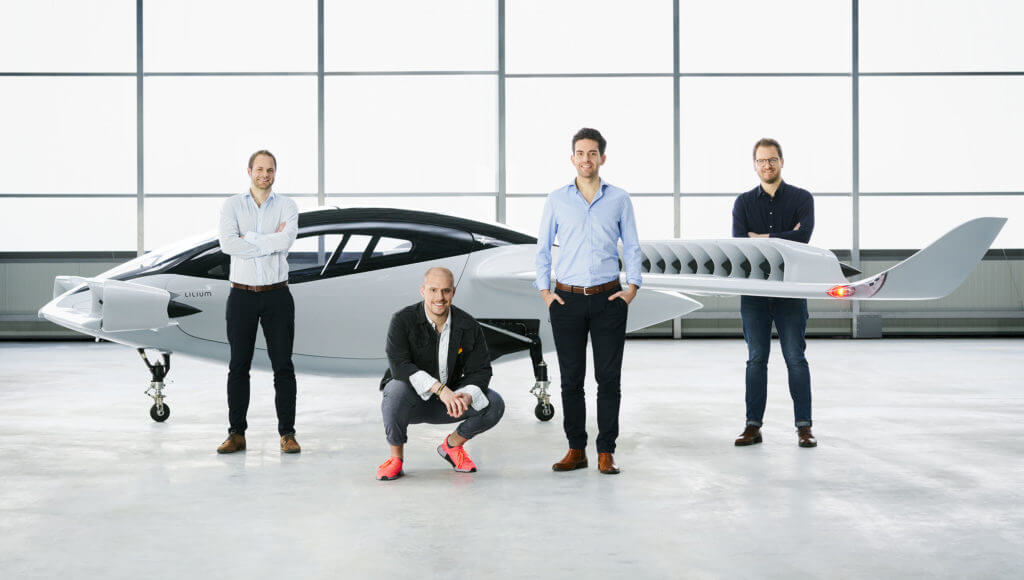Lilium, the Munich-based startup developing a revolutionary on-demand air taxi service, revealed on May 16 its new five-seater air taxi prototype for the first time. The unveiling of the new Lilium Jet came as the all-electric aircraft completed its maiden flight in the skies over Germany earlier this month.

The full-scale, full-weight prototype is powered by 36 all-electric jet engines that allow it to take-off and land vertically, while achieving remarkably efficient horizontal, or cruise, flight. The simplicity of the aircraft design, with no tail, no rudder, no propellers, no gearbox and only one moving part in the engine not only contributes to the safety and affordability of the aircraft, but it has also allowed the design team to focus their efforts on creating a magical customer experience in the cabin, from panoramic windows to gull-wing doors.
Celebrating the landmark, Daniel Wiegand, co-founder and CEO, said: “Today we are taking another huge step towards making urban air mobility a reality. In less than two years we have been able to design, build and successfully fly an aircraft that will serve as our template for mass production. Moving from two to five seats was always our ambition as it enables us to open up the skies to many more travelers.
“Whether its friends or families flying together or business travelers ride-sharing into the city, having five seats delivers an economy of scale you just can’t achieve with two. The Lilium Jet itself is beautiful and we were thrilled to see it take to the skies for the first time. With the perfect balance of range and speed, our aircraft has the potential to positively impact the way people choose to live and travel, all over the world.”
With a top speed of 300 kilometers per hour (186 miles per hour) and a range of 300 km (186 miles), the Lilium Jet is capable of completing much longer journeys than the majority of its competitors. This is, in part, thanks to the fixed-wing design of the aircraft. While drone-based aircraft consume much of their energy keeping an aircraft in the air, the Lilium Jet can rely on the lift generated by the fixed-wing to do this, meaning it will require less than 10 percent of its maximum 2,000 horsepower during cruise flight.
This efficiency, which is comparable to the energy usage of an electric car over the same distance, means the aircraft would not just be capable of connecting suburbs to city centers and airports to main train stations, but would also deliver affordable high-speed connections across entire regions.
The Lilium Jet first took to the air at 8:03 a.m. local time on May 4, 2019, having completed extensive ground testing at Lilium’s HQ in Munich, Germany. The prototype aircraft, which is controlled remotely from the ground, has since begun a rigorous flight test campaign that will prove its capability and lay the foundations for certification of the aircraft to safety standards comparable to those of large commercial aircraft.
Commenting on the successful first flight, Leandro Bigarella, head of flight test, said: “While a maiden flight is always a moment of truth for a business, the Lilium Jet performed exactly as expected and responded well to our inputs. Our flight test program will now continue with increasingly complex maneuvers as we look towards our next big goal of achieving transition flight, which is when the aircraft moves seamlessly from vertical to horizontal flight.”
Lilium plans to manufacture and operate the Lilium Jet as part of a revolutionary on-demand air taxi service. At the push of a button, passengers will be able to use the Lilium app to locate their nearest landing pad and plan their journey with ease. Choosing from a network of pads across cities and regions, passengers will enjoy journeys that are comparable in price with a taxi, yet four times faster. Lilium expects to be fully-operational in various cities around the world by 2025, although trial services will start earlier than this in several locations.
Commenting on Lilium’s vision for urban air mobility, Wiegand added: “We dream of a world where anyone can fly wherever they want, whenever they want. We’ve invested a tremendous amount of thought and care into designing an aircraft and a service that will let us deliver this, meeting society’s demands for urban air travel that is quiet, safe and environmentally positive.
“Getting to this point has meant tackling some of aerospace’s greatest challenges, but now we’re here we can focus on bringing our vision to life and connecting communities in ways they have never been connected before. Whether it’s reducing the need for investment in ground-based infrastructure like road or rail, or opening up new areas to economic opportunities, we believe that urban air mobility has the potential to be a remarkable force for good in society and we look forward to working across our sector to achieve this.”
The latest five-seater Lilium Jet builds on the successful flight testing of a two-seater prototype in 2017. The two-seater prototype provided proof of concept for Lilium’s signature transition flight maneuver, where the aircraft shifts from vertical to horizontal flight, and laid the groundwork for today’s prototype.
The five-seater prototype will now enter a rigorous flight test campaign that will see it demonstrate its full range of capabilities.









